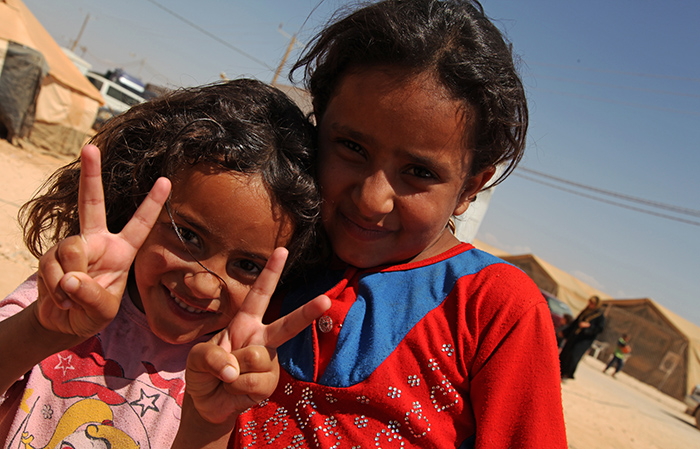“There are so many foreigners here — the whole world loves us,” said Um Ali, as she and her son shuffled through the endless sands of Zaatari Camp, the tent city in northern Jordan, which by mid-September was home to some 31,000 Syrian refugees and, indeed, an impressive contingent of, mainly foreign, aid workers.
Past the entrance of the gated camp, guarded by the Jordanian Army, there is first of all a separate, smaller tent city for some 15 humanitarian organizations. Foreign media regularly pass by, especially so when Angelina Jolie visited the camp on September 11. Dozens of news organizations were present to catch a glimpse of the American movie star and special envoy to the United Nations High Commissioner for Refugees (UNHCR).
Um Ali had never heard of Jolie. The 45-year-old mother of five had fled Deraa a few days earlier, following heavy air raids. Free Syrian Army fighters had helped her cross the border, which is only a 15-minute-walk away from Deraa. Um Ali needed a doctor. Nothing serious. Her son had an irritated eye. “It’s the sand,” Um Ali said. “There is sand everywhere.”
Not surprisingly, as Camp Zaatari is situated in a desert some 12 kilometers west of the northern Jordanian city of Mafraq. The first tents set up in July were once white, but today have a dusty brown tan, on which the UN-logo is barely visible. In addition to sand, refugees complained about scorpions, snakes, the lack of electricity and, most importantly, the fact that no one is allowed to leave or enter the camp without government permission.
In August, a march protesting the camp’s conditions ended in a violent clash with Jordanian police. Dozens of people were injured and arrested, after which Fayez Tarawneh, Jordan’s fourth royally-appointed Prime Minister in 18 months, threatened to send all troublemakers back to Syria.
That never occurred and did not shy Jordanian officials away from calling for no less than $700 million in foreign aid in a press conference with Miss Jolie. “Jordan has become one of the victims of the Syrian crisis,” said Samih Maaytah, Jordan’s Minister of Information and Communication. “The world needs to open its pockets and provide support for the reception of more Syrian refugees.”
Now, Jordan is of course a poor country with few natural resources. Still, the amount of $700 million seems a lot, knowing most Syrian refugees in Jordan (150,000 by some estimates) cope with little or no official help. Some aid workers argued that Camp Zaatari may swell to some 100,000 inhabitants by year’s end, yet one UNICEF official said: “Honestly, no one knows how many people may or may not come.”
And even if so, the wellbeing of the camp’s 31,000 inhabitants is hardly the sole responsibility of the Jordanian authorities. In terms of medical aid, for example, the French Army has a field hospital in the camp with specialized units for vaccinations, gynecology and psychology. Next to it, the Moroccan Army offers exactly the same and next to them there is a smaller Italian unit. The King Hussein Foundation for Family Health is present, as well as three health clinics.
What’s more, the United Nations’ World Food Program feeds the camp and trucks in a million liters of water each day. UNICEF aims to start schools for the children, which make up 50 percent of the camp’s population, and the UNHCR is responsible for things such as tents, mattresses and blankets.
Still, to anyone visiting the camp it must be clear that the Jordanian Hashemite Charity Organization (JHCO) is in charge. Their logos and offices pop up just about everywhere and journalists must report to the JHCO upon arrival. “We manage the camp and all organizations inside,” said JHCO media envoy Abdelmajed. “Including the UN?” I asked. “Yes,” he replied hesitantly. “But we do more of a coordinating than managing job.”
At first, he also intended to manage the media. It took some time to convince him he did not need to accompany me on what, according to him, should be a 2-hour visit. Despite all good intentions and the refugees’ suffering and needs, I could not escape the feeling of being in prison. There was a way out. While an official permit is hard to get, one man said, the soldiers at the gate turn a blind for JD 350 ($525).
EXECUTIVE MAGAZINE
OCTOBER 7, 2012
